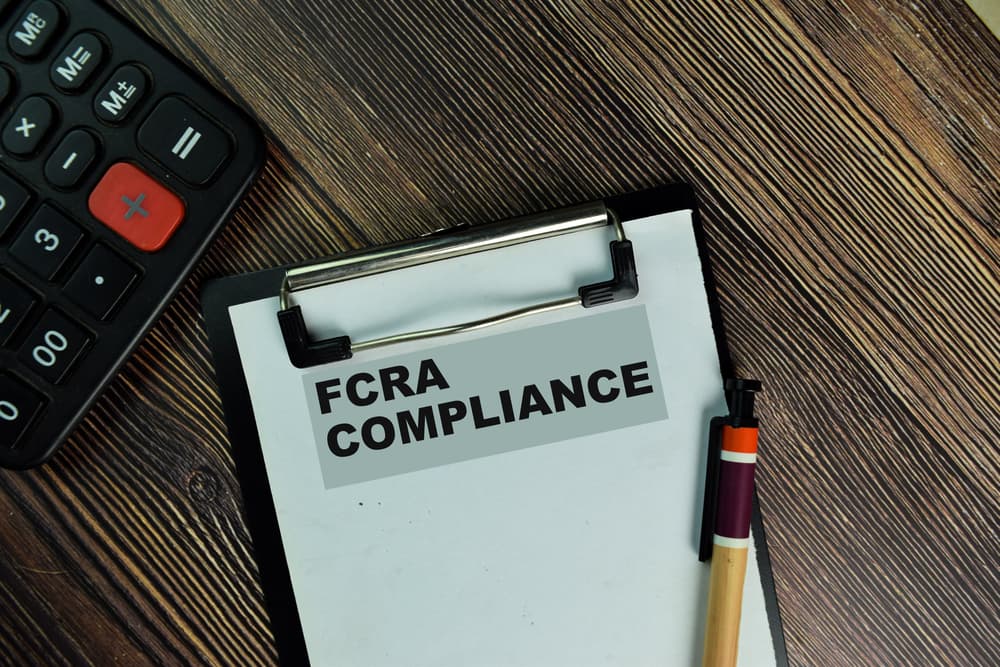The federal Fair Credit Reporting Act (FCRA) sets the baseline for consumer rights and reporting agency obligations across the United States, ensuring the accuracy, fairness, and privacy of consumer information.
However, California, known for its proactive approach to consumer protection, implements its version of the FCRA, introducing specific rules and heightened safeguards that coexist with the federal standards.
Distinguishing between the Federal FCRA and the California FCRA is not just about compliance; it's about safeguarding consumer rights and additional protections afforded to Californians.
For those dealing with credit reporting, employment decisions, or other issues related to background checks in California, knowing how you can benefit from both federal and California laws is not just useful but necessary.
If you are struggling with a credit reporting issue and need legal help, it's wise to contact a California FCRA attorney who can get justice and compensation for violations of your rights.
What is the Federal FCRA?

The Federal Fair Credit Reporting Act (FCRA), enacted in 1970, forms the framework for consumer reporting practices in the United States.
This act focuses on ensuring the accuracy, fairness, and privacy of consumer information handled by credit reporting agencies. Here's a breakdown of its key aspects:
- Consumer Rights Under the Federal FCRA
- Consumers have the right to access their credit information and dispute any inaccuracies.
- Annual free credit reports from each of the major credit bureaus are guaranteed.
- The act sets limits on the use of credit information for employment screening.
- Obligations of Reporting Agencies
- Credit reporting agencies must maintain accurate and up-to-date information.
- They are required to respond to disputes and correct information within a specified timeframe.
- Agencies must obtain consent before providing credit information for employment purposes.
- Regulations for Credit Information Usage
- Limits are set on how long adverse information can remain on a credit report.
- Specific guidelines govern the use of credit information for employment, insurance, and other purposes.
The Federal FCRA, by standardizing these practices, plays a significant role in protecting consumers against misuse and misrepresentation of their credit information.
However, it also leaves room for states to implement additional measures, provided they do not contradict the federal guidelines.
The California FCRA: Additional Provisions and Differences
California has implemented its version of the FCRA, which includes the California Investigative Consumer Reporting Agencies Act (ICRAA) and the California Consumer Credit Reporting Agencies Act (CCRAA).
These laws align with the federal FCRA but introduce additional measures:
- California Investigative Consumer Reporting Agencies Act (ICRAA)
- This law pertains to more detailed background checks that go beyond credit reports.
- It covers areas such as criminal background checks and character assessments.
- California Consumer Credit Reporting Agencies Act (CCRAA)
- The CCRAA focuses specifically on credit reports.
- It outlines conditions under which California employers can perform credit checks.
- Stricter Consumer Protections
- Both ICRAA and CCRAA often have stricter guidelines compared to the federal FCRA.
- They offer additional protections in areas like bankruptcy, arrest records, and salary history.
- Compliance Challenges
- Employers and credit reporting agencies must comply with both federal and state laws.
- In scenarios where state and federal laws differ, the law providing greater consumer protection typically takes precedence.
Comparative Analysis: Federal FCRA vs. California FCRA
When comparing the Federal Fair Credit Reporting Act (FCRA) with the California FCRA, several key differences stand out.
These variations primarily concern the extent of consumer protections and the scope of information reporting.
Understanding these differences is necessary for FCRA compliance and for upholding the rights of individuals whose information is being reported.
- Bankruptcies, Arrest Records, and Convictions Reporting
- Federal FCRA allows bankruptcy information to be reported for up to ten years. In contrast, California laws limit the reporting of bankruptcies to seven years.
- Regarding arrest records, the Federal FCRA does not restrict the reporting of arrest information that did not lead to a conviction, while California laws prohibit the reporting of arrest records that are more than seven years old and did not result in a conviction.
- Employment Background Checks and Consumer Rights
- The Federal FCRA requires employers to obtain written consent from an individual before conducting a background check. California laws further emphasize this requirement and include specific provisions about the format and content of the consent form.
- California laws also have stricter guidelines for notifying individuals about the use of their credit reports for employment purposes and provide more detailed disclosures.
- Scope of Information Reporting and Time Frame
- The Federal FCRA has general guidelines on the time frame for reporting adverse information, typically seven years. However, California laws often impose stricter limitations, particularly concerning salary and criminal history information.
- California’s laws also address specific types of information that can be reported, offering broader protections for consumer privacy and the accuracy of information.
These distinctions highlight the importance of being aware of both federal and state-specific regulations.
For businesses operating in California, adhering to the state's FCRA laws, in addition to the federal law, is crucial to avoid legal issues and protect consumer rights.
Legal Implications and Compliance of the FCRA

The differences between the Federal Fair Credit Reporting Act (FCRA) and the California FCRA have significant legal implications for businesses, especially those operating in California. Compliance with both sets of laws is not just a matter of legal obligation but also a step towards maintaining ethical standards and protecting consumer rights.
- Legal Implications for Non-Compliance
- Failure to comply with the Federal FCRA can lead to legal challenges, including lawsuits and fines. This is also true for the California FCRA, which has its own set of penalties for non-compliance.
- For businesses operating in California, adhering to the stricter provisions of the state law is often the safer route, as it typically encompasses the federal requirements as well.
- Best Practices for Compliance
- Employers and credit reporting agencies should regularly review their policies and procedures to ensure they align with both federal and California regulations.
- It's advisable to seek legal advice or consult with professionals who have a thorough understanding of these laws to avoid potential legal pitfalls.
- Regular staff training involved in credit reporting and employment screening can help maintain compliance and awareness of these laws.
- Maintaining Accurate and Fair Reporting
- Businesses must ensure that the information they report or use is accurate and fair. This includes promptly correcting any inaccuracies and respecting the privacy and rights of individuals.
- Staying up to date with any amendments or changes to both the federal and California FCRA is key to maintaining compliance.
Businesses should not underestimate the importance of compliance with these laws. Adhering to them not only avoids legal issues but also demonstrates a commitment to fair business practices and respect for consumer rights.
FCRA Case Studies and Legal Precedents
Examining case studies and legal precedents is a valuable way to understand the practical application and implications of the Federal Fair Credit Reporting Act (FCRA) and the California FCRA.
These real-world examples highlight how the laws are interpreted and enforced, providing insight into compliance and the consequences of violations.
- Case Studies of FCRA Compliance
- There have been numerous cases where businesses faced legal action due to non-compliance with FCRA regulations. These include instances where companies failed to obtain proper consent for background checks or used outdated information in their reports.
- Specific cases in California have also shed light on the nuances of state-specific FCRA laws, such as the importance of adhering to stricter state guidelines on reporting arrest records and bankruptcies.
- Legal Precedents Set by Courts
- Court rulings in cases related to the FCRA set important precedents for how the laws are interpreted and applied. For instance, rulings have clarified the obligations of credit reporting agencies in verifying the accuracy of the information they provide.
- In California, appellate court decisions have provided clarity on the application of the ICRAA, particularly in how it relates to the CCRAA and the Federal FCRA.
- Implications for Businesses and Individuals
- These case studies and legal precedents serve as reminders of the importance of thorough compliance with both federal and state FCRA laws.
- They also underscore the potential legal and financial consequences of failing to adhere to these regulations.
For businesses, especially those operating in multiple states, these case studies emphasize the need for a comprehensive understanding of and adherence to both federal and state laws regarding consumer reporting.
Staying informed about legal developments in this area can help prevent costly legal challenges and foster more responsible business practices.
Both sets of laws play a pivotal role in regulating the use and reporting of consumer information.
While the federal law provides a nationwide standard, California's laws offer additional layers of protection for its residents.
- Key Takeaways
- The Federal FCRA sets the baseline for consumer reporting standards across the United States, focusing on accuracy, fairness, and privacy.
- The California FCRA, including the ICRAA and the CCRAA, builds upon these federal standards by introducing more stringent requirements in certain areas, such as bankruptcy reporting and employment background checks.
- Importance for Businesses and Individuals
- For businesses, particularly those operating in California, it's important to comply with both federal and state regulations to avoid legal issues and uphold ethical standards.
- Individuals, especially those in California, benefit from enhanced protections under state law, which provide greater control and transparency over their personal information.
- Staying Informed and Compliant
- Regularly updating policies and procedures following both federal and state laws is necessary for businesses.
- Individuals should be aware of their rights under both the federal and California laws, particularly regarding access to and the accuracy of their personal information.
- Seeking Professional Guidance
- Given the complexities and evolving nature of these laws, consulting with legal professionals for guidance and compliance strategies is a prudent approach.
- Staying abreast of legal developments and case law in this area can provide valuable insights into how these laws are applied and enforced.
Understanding and adhering to the Federal FCRA and the California FCRA is vital for both businesses and individuals.
These laws ensure the responsible use and reporting of consumer information, protecting privacy and preventing misuse.
Contact a California FCRA Attorney from Kazerouni Law Group

If you're dealing with challenges related to the Fair Credit Reporting Act (FCRA) in California, or seeking guidance on adhering to both federal and state FCRA laws, Kazerouni Law Group is available to provide the necessary legal assistance.
- Legal Services Offered by Kazerouni Law Group
- Focused Guidance on FCRA: Kazerouni Law Group offers clear, direct advice on Federal and California FCRA laws.
- Assistance for Both Businesses and Individuals: The firm is equipped to support both businesses in need of compliance strategies and individuals facing issues with credit report inaccuracies.
- Resolving Credit Reporting Disputes: They guide clients through correcting credit report issues and addressing unfair practices effectively.
- Kazerouni Law Group’s Experience with FCRA
- The team has substantial experience in consumer protection and credit reporting law cases and a successful history of winning over $1 billion for their clients.
- They are knowledgeable in both federal and state-level FCRA regulations and can provide legal representation in related disputes or compliance matters.
- Choosing Kazerouni Law Group
- With its background in FCRA-related cases, Kazerouni Law Group is a suitable choice for those requiring legal assistance in this area.
- The firm's team is prepared to handle the complexities of these laws and offer practical solutions.
- Consultation Process
- Kazerouni Law Group typically offers initial consultations to discuss your specific situation and how they can assist.
- It's beneficial to prepare any relevant documents and questions for this initial meeting.
- Getting in Touch
- To schedule a consultation or to learn more about their services, you can contact Kazerouni Law Group directly by calling 800-400-6808 or chatting with a consumer protection lawyer in California online.
For individuals and businesses facing FCRA-related issues, reaching out to Kazerouni Law Group can provide the tailored legal support necessary for your unique circumstances.